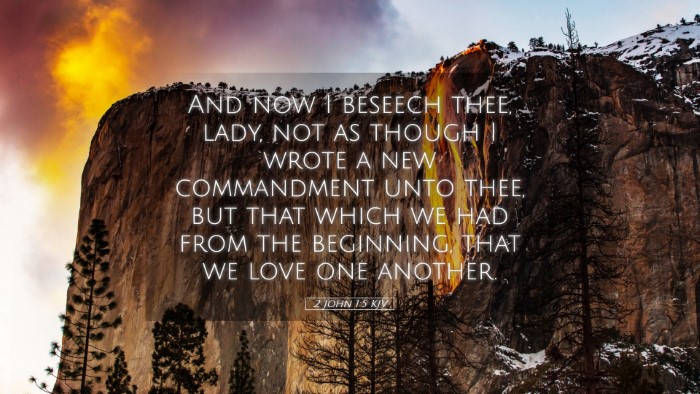Commentary on 2 John 1:5
Verse: "And now I beseech you, lady, not as though I wrote a new commandment unto you, but that which we had from the beginning, that we love one another."
Introduction
This verse from 2 John encapsulates a vital aspect of Christian teaching—the call to love one another. The apostle John emphasizes that this is not a new commandment, but one rooted in the teachings of Jesus from the very beginning of His ministry. This deeply resonates with themes found throughout the New Testament, especially concerning the nature of Christian community and fellowship.
Exegesis of the Text
In this epistle, John addresses a congregation (referred to as "lady"), underscoring a personal and communal responsibility among believers. The term "lady" could refer to a specific person or be an allegorical representation of the church itself. This duality points to the importance of both individual believers and the body of Christ working in harmony.
The Nature of Love
John is known as the apostle of love, frequently emphasizing the necessity of love in the life of a believer. Here, he reminds us that love is a divine commandment, not based on human emotions but on the character of God. In the words of Matthew Henry, love among believers is essential as it manifests the truth of the Gospel and reflects the nature of God Himself.
Historical Context
This exhortation appears to stem from John's concern over false teachers who distort the truth of the Gospel. The Apostle's intent is to redirect his readers' focus on fundamental truths, such as love, which is central to their faith. Albert Barnes notes that this love is to be expressed actively within the community—an imperative response to false teachings that undermine the collective faith.
The Commandment of Love
In the biblical narrative, love is elevated as the greatest commandment (Matthew 22:37-39). John's assertion that he is not writing a "new commandment" indicates his belief that love is foundational to Christian ethics. Adam Clarke elaborates on this by stating that the essence of Christianity is enveloped in love; it not only constitutes a duty but also reflects the believer's relationship with God.
Application for Today
- The Nature of Christian Community: The church is called to embody love within its structure, fostering unity and discouraging division.
- Authenticating Faith: A hallmark of genuine faith is the tangible love manifested toward fellow believers and the wider community.
- Responding to False Teachings: Pastors and leaders must emphasize love and truth as integral to rebutting false ideologies that may infiltrate the church.
Conclusion
In summary, 2 John 1:5 serves as a powerful reminder that love remains a timeless command for all believers. This charge reverberates through the ages, challenging every generation to embody the love of Christ. By grounding ourselves in the teachings of scripture and fostering a loving community, we honor not just the command but also the God who gave it. As local churches and global congregations, the call to love one another remains our greatest and most enduring witness to the watching world.


